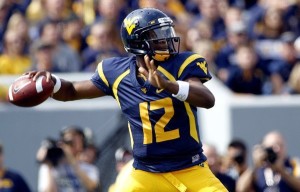One could argue that if you group together all quarterbacks drafted in the first three rounds (after removing the top five or ten picks), you won’t find any significant relationship between draft slot and performance. That’s not where this post is going, though. Instead I’ll take a narrower view and note that Geno Smith became the 44th quarterback drafted in the second half of the first round or the first half of the second round since 1978. Those cut-offs should give us a good look at quarterbacks ignored by teams picking in the top half of the first round but quarterbacks who were otherwise good enough to be drafted relatively early. This analysis generally applies to EJ Manuel, too, although he technically misses the cut-off as the 16th pick of the first round. Once we leave out the quarterbacks drafted since 2009 — Brandon Weeden, Andy Dalton, Colin Kaepernick, Tim Tebow, Jimmy Clausen, Josh Freeman, and Pat White — we’re left with 36 quarterbacks.
The table below shows each of those quarterbacks, along with the year they were drafted, the round, the overall pick, and the team that selected them. How did they turn out? I’ve included their number of seasons starting, number of games and games started, career passing yards and passing touchdowns, and also their number of Super Bowl wins, Super Bowl appearances, and Pro Bowls. The final row shows the median for each category (and for the last three columns, the average). Obviously this will shortchange some of the active quarterbacks, but you get the general idea.
What should the expectation be for Smith? Eighteen of the quarterbacks did not even start 48 games, so it would be unwise to “expect” that Smith will be the quarterback of the future. It’s up to the coaches as to whether he should start in 2013: I generally think players get better when they receive more reps, but many scouts think Smith is a raw prospect. If he’s going to be overwhelmed by Marty Mornhinweg’s West Coast system, it won’t benefit anyone to insert him into a mediocre lineup when he doesn’t fully understand the playbook.
When you look at the recent rookie quarterbacks to succeed, none of them played in a traditional West Coast offense. Robert Griffin III played under a WCO coach in Mike Shanahan, but the Redskins tailored the playbook to RG3 instead of asking him to learn their scheme. Russell Wilson‘s offensive coordinator is Darrell Bevell, who also has WCO roots (he coached under Mike Sherman in Green Bay and Brad Childress in Minnesota) and uses West Coast terminology, but the read-option elements and a punishing ground game made life easier for Wilson. None of Andrew Luck (Bruce Arians hates the West Coast offense), Cam Newton (Rob Chudzinski), Matt Ryan (Mike Mularkey), Joe Flacco (Cam Cameron), and Ben Roethlisberger (Ken Whisenhunt) played in a West Coast offense as rookies, either.
Traditionally, the school of thought was that learning the West Coast offense (especially the terminology) takes awhile, and that goes double for rookies. Aaron Rodgers sat on the bench behind Brett Favre, so he never had to struggle as a rookie. We do have one really useful example of how a rookie quarterback might take to Mornhinweg’s offense: Nick Foles started the last six games of 2012 for the Eagles with mediocre results. By that point in the season, Philadelphia’s offense had been decimated by injuries, but a 1-5 record and a 5.5 NY/A average isn’t inspiring no matter the caveats.
Perhaps the more relevant comparison will be to Jimmy Clausen, although not in the way you might think. Regardless of how Smith performs, his low salary makes it easy for the Jets to draft a quarterback in the first round next season. After a terrible rookie year, the Panthers earned the first pick in the draft, and selected Newton. Even if Smith doesn’t take a snap next year, his selection shouldn’t prevent the Jets from selecting Teddy Bridgewater, Tajh Boyd, Johnny Manziel, David Fales, Aaron Murray, Marcus Mariota, Brett Hundley, or any other college quarterback who earns a high first round grade for the 2014 draft. The issue for the Jets will be balancing the need to find out what they have in Smith with throwing a raw player into the fire too early.

